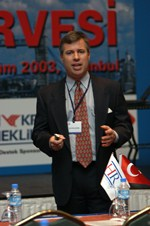ATD Blog
Being a Business Results Detective
Tue May 29 2018


Content
Joe Willmore is president of the Willmore Consulting Group, a performance consulting firm located near Washington, D.C. He has more than 35 years’ consulting experience with a wide range of clients, including the World Bank, Intelsat, Lockheed Martin, the U.S. Navy, Booz Allen Hamilton, and the Smithsonian Institution. He is the author of Performance Basics , was one of the first facilitators certified by the Association for Talent Development to (formerly ASTD) to lead its Human Performance Improvement workshop series , and has served on ATD’s Board of Directors.
Joe Willmore is president of the Willmore Consulting Group, a performance consulting firm located near Washington, D.C. He has more than 35 years’ consulting experience with a wide range of clients, including the World Bank, Intelsat, Lockheed Martin, the U.S. Navy, Booz Allen Hamilton, and the Smithsonian Institution. He is the author of Performance Basics, was one of the first facilitators certified by the Association for Talent Development to (formerly ASTD) to lead its Human Performance Improvement workshop series, and has served on ATD’s Board of Directors.
Content
As part of ATD’s series of interviews with industry leaders to mark its 75th year, we've asked Joe to share some insight and predictions on the field of performance improvement. Here’s what he had to say.
As part of ATD’s series of interviews with industry leaders to mark its 75th year, we've asked Joe to share some insight and predictions on the field of performance improvement. Here’s what he had to say.
What’s your short definition of performance improvement?
Content
Performance improvement is a systematic and systemic approach to achieving organizational goals by closing human performance gaps. This approach works because it remains more objective, relying on data and focusing on organizational priorities. In other words, it operates outside of silos and doesn’t lose sight of what is most important. What’s more, it prioritizes the identification of the causes of performance gaps. In this way, it doesn’t focus on slapping a Band-Aid on problems, but rather addresses the real issues affecting the organization’s ability to achieve business goals.
Performance improvement is a systematic and systemic approach to achieving organizational goals by closing human performance gaps. This approach works because it remains more objective, relying on data and focusing on organizational priorities. In other words, it operates outside of silos and doesn’t lose sight of what is most important. What’s more, it prioritizes the identification of the causes of performance gaps. In this way, it doesn’t focus on slapping a Band-Aid on problems, but rather addresses the real issues affecting the organization’s ability to achieve business goals.
What are the must-have skills for industry professionals?
Content
No doubt, front-end analysis skills are critical. These skills focus on learning how to address analyzing the business priorities, understanding performance, and breaking down the causes (and solutions) for a specific gap.
No doubt, front-end analysis skills are critical. These skills focus on learning how to address analyzing the business priorities, understanding performance, and breaking down the causes (and solutions) for a specific gap.
Content
Ultimately, though, being a performance consultant is really about being an organizational results detective—figuring out why things are the way they are and what to do about it. This means being a good listener and excellent at gathering data. You need to keep an open mind, be objective, and avoid jumping to conclusions too soon.
Ultimately, though, being a performance consultant is really about being an organizational results detective—figuring out why things are the way they are and what to do about it. This means being a good listener and excellent at gathering data. You need to keep an open mind, be objective, and avoid jumping to conclusions too soon.
Content
Unfortunately, too many people don’t really understand what performance improvement is. They think that if they’re a good trainer, facilitator, or OD consultant, then they’re a performance consultant. But being a performance consultant means following a systematic and systemic approach to uncovering problems. Sadly, there is a tendency to cut corners.
Unfortunately, too many people don’t really understand what performance improvement is. They think that if they’re a good trainer, facilitator, or OD consultant, then they’re a performance consultant. But being a performance consultant means following a systematic and systemic approach to uncovering problems. Sadly, there is a tendency to cut corners.
What business trends do you predict will shake up our industry in the next five years?
Content
Like other parts of business, there’s more pressure for speed. We’re also seeing more virtual workspaces, so performance problems have virtual components. Likewise, workforces are becoming more diverse, multicultural, and global (off-shoring, for instance). All of these factors have been affecting business for some time, but they seem to be accelerating. This sort of dispersed workforce can make it more difficult to pinpoint certain issues that create performance gaps or a company’s capability to launch initiatives that address gaps.
Like other parts of business, there’s more pressure for speed. We’re also seeing more virtual workspaces, so performance problems have virtual components. Likewise, workforces are becoming more diverse, multicultural, and global (off-shoring, for instance). All of these factors have been affecting business for some time, but they seem to be accelerating. This sort of dispersed workforce can make it more difficult to pinpoint certain issues that create performance gaps or a company’s capability to launch initiatives that address gaps.
Content
Also, today there is more emphasis on white collar work, which tends to have a high level of cognitive requirement. It was easier to observe performers during the industrial age. Simply stated, you could watch how people accomplished their work. But “watching” how someone thinks requires a different approach.
Also, today there is more emphasis on white collar work, which tends to have a high level of cognitive requirement. It was easier to observe performers during the industrial age. Simply stated, you could watch how people accomplished their work. But “watching” how someone thinks requires a different approach.
What guidance do you have to people coming up in the ranks? Do you have any advice for experienced practitioners on how to stay relevant?
Content
For beginners, I think it’s important to talk to giants in the field of performance improvement like Paul Elliott and Dana Robinson. While these pioneers are still practicing their craft, new practitioners would be wise to drink from their expertise. As I built my career, I had the rare opportunity to interact with people like Geary Rummler, Rebecca Birch, and other folks who have contributed a lot to the field but are no longer with us. I feel very fortunate to have tapped into their knowledge.
For beginners, I think it’s important to talk to giants in the field of performance improvement like Paul Elliott and Dana Robinson. While these pioneers are still practicing their craft, new practitioners would be wise to drink from their expertise. As I built my career, I had the rare opportunity to interact with people like Geary Rummler, Rebecca Birch, and other folks who have contributed a lot to the field but are no longer with us. I feel very fortunate to have tapped into their knowledge.
Content
For experienced more professionals, I would say it is time to focus less on HR issues. Instead, I suggest finding ways to connect more with business executives or operations managers as your clients. They need to be ready to learn and apply new business skills to be able to partner effectively.
For experienced more professionals, I would say it is time to focus less on HR issues. Instead, I suggest finding ways to connect more with business executives or operations managers as your clients. They need to be ready to learn and apply new business skills to be able to partner effectively.
Content
Whether new to the field or longtime pros, it’s critical for everyone to connect with others in our community through organizations like ATD. Personally, I can say that ATD helped me build my formal knowledge and skills around performance improvement—through its magazines, books, research, and so on. ATD also helped me network with other performance consultants at events like the annual conference. More importantly, through these publications and events, ATD gave me a platform to spread the word on performance improvement.
Whether new to the field or longtime pros, it’s critical for everyone to connect with others in our community through organizations like ATD. Personally, I can say that ATD helped me build my formal knowledge and skills around performance improvement—through its magazines, books, research, and so on. ATD also helped me network with other performance consultants at events like the annual conference. More importantly, through these publications and events, ATD gave me a platform to spread the word on performance improvement.
What is it about your work that's really inspired you over the years?
Content
First, we make a difference to the business. Our work has a real impact and the potential to change and improve an organization’s bottom line in a measurable way. Second, I think the variety of our work is a major plus. It certainly never gets boring.
First, we make a difference to the business. Our work has a real impact and the potential to change and improve an organization’s bottom line in a measurable way. Second, I think the variety of our work is a major plus. It certainly never gets boring.
